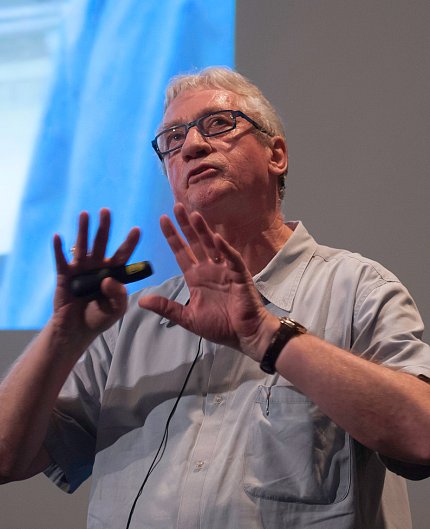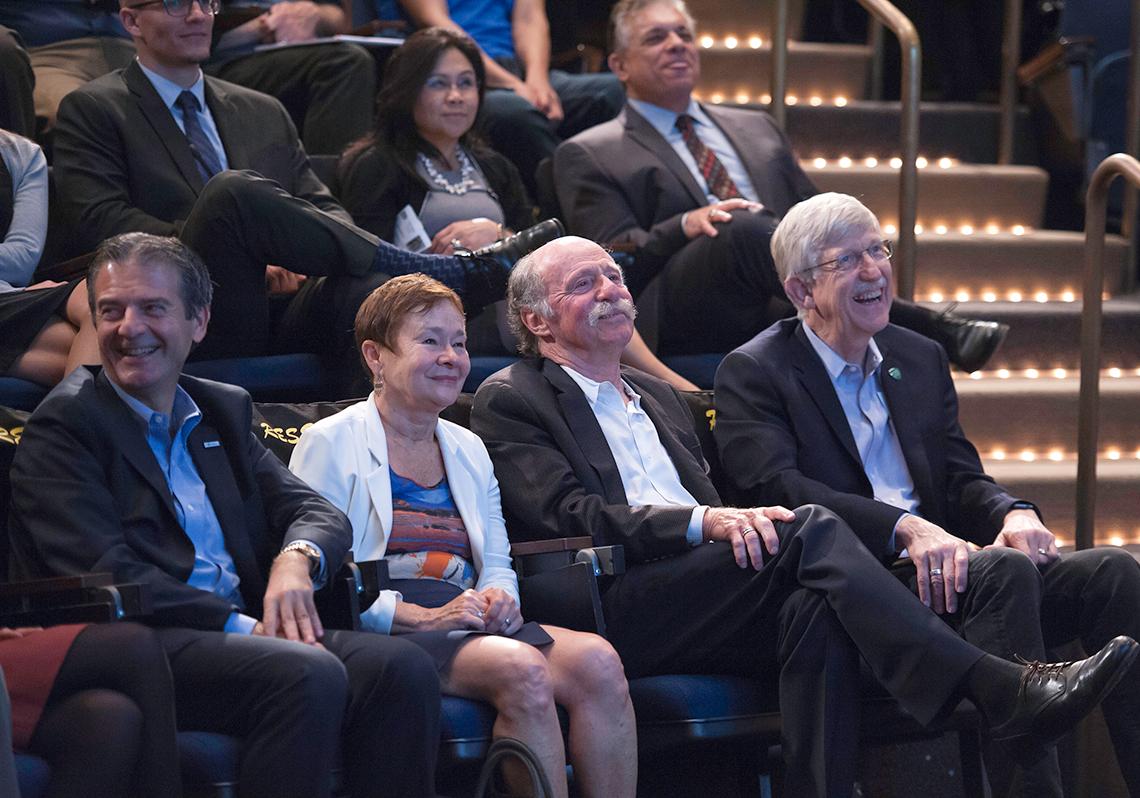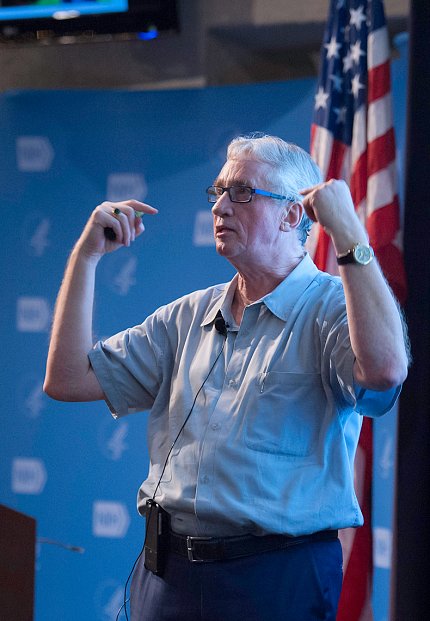Animal Instincts
Biologist Studies How Species Reconcile, Cooperate

Photo: Marleen Van Den Neste
In the minutes before the inaugural talk in the Gadlin Lecture Series, dozens of people entered Lipsett Amphitheater in search of empty seats. When reserved seats were opened to the first takers, the seatless scurried over to claim chairs, in what almost seemed like a behavioral experiment set up by the guest speaker.
The lecture honored Dr. Howard Gadlin, director emeritus of NIH’s Office of the Ombudsman, Center for Cooperative Resolution, who attended the talk. The overflow crowd was a testament to the lecture that was to follow by Dr. Frans de Waal, director, Living Links Center and psychology professor at Emory University. A renowned biologist and primatologist, de Waal studies animal social behavior and repeatedly demonstrates that animals are emotional, empathetic beings.
In biology, “Emotions prime you for action,” said de Waal. “Being fearful doesn’t do you any good unless the fear makes you escape or fight.” It is unclear if, like people, animals are conscious of their emotions and have the sort of feelings that we often express in language.
“Emotions are expressed in the body and that’s something we can see and measure,” he said.
A kiss, for example, is not always just a kiss. Chimpanzees kiss when they greet each other or to make up after fighting, similar to humans, said de Waal. When bonobos, close relatives to chimps, are physically attracted, they tongue kiss, much like humans. The kissing gourami, however, is a fish that locks lips not with affection, but out of aggression.
Anyone who strenuously objects to anthropomorphism—attributing human-like behavior to animals—is in what de Waal has termed “anthropo-denial.”
When a baby gorilla gets tickled, the noises he makes may not sound to us like laughter, but it’s his version of the giggles. People are not different from other primates, de Waal underscored. “You need to respect in your language the homologies [shared characteristics among species] that exist.”
Different animals at times get competitive, aggressive or even jealous, said de Waal, but most are inclined toward cooperation. Primates, for example, are generally playful, peaceful creatures that sometimes fight. Afterward, they reconcile and even comfort each other.

Photo: Marleen Van Den Neste
Macaques are known to be conciliatory, said de Waal, but other monkey species are less appeasing. Another animal that rarely reconciles is the domestic cat. But from observing animal infidels in the wild and in captivity, de Waal said, elephants, wolves, dolphins and even some birds are among the many species that make peace after fighting.
“I’m from a family of six boys, which maybe primed me to study these phenomena,” he said.
De Waal primarily works with chimps and bonobos, which tend to be cooperative by nature. In one experiment, several chimps had to simultaneously pull a lever to get food. Despite some mild competition and a few freeloaders, the chimps learned they had to work together to get their reward, which they ultimately shared with each other.
Great apes are also known for their empathy. When a bonobo cries, another rushes to hug and console him. Elephants do this too. They wrap their trunks around each other when one is upset.
Apes and elephants both go a step further, helping friends in need, such as an elephant helping another out of a ditch or a chimp choosing the right tool for a task and handing it to another chimp.
“Targeted helping requires a cognitive understanding of what the problem is and what the solution is, and I think certain large-brained species are capable of that,” said de Waal. “Animals who also [can recognize themselves in the mirror] may have more complex forms of empathy than those who don’t.”

Photo: Marleen Van Den Neste
Rowena, a chimp with a hole on her head from a scuffle, looked in the mirror, inspecting her injury. Pepsi, the elephant, looked in the mirror, taking his trunk up to touch a mark above his eye. “Your dog doesn’t do this,” said de Waal. “If your dog does this, I want you to call me.”
Many animals prove time and again that they’re caring, sharing creatures, particularly among their own kind. A bonobo will share his food with another bonobo, even though it means less food for him. In the wild, when threatened by a leopard or other predator, chimps will selflessly endanger themselves to rescue a fellow chimp.
“We were the first ones to demonstrate that chimpanzees do care about the well-being of others,” said de Waal. In fact, chimps will even refuse a reward until the other chimp gets one.
Monkeys, on the other hand, aren’t so altruistic and get especially flustered at unequal rewards. When doing the same simple task rewards one monkey with a cucumber and the other with a more coveted grape, the first monkey screeches in protest.
“I look at my monkeys as capitalists,” said de Waal. “They’re comparing their income, after all.”
Chimpanzees, like people, sometimes equalize the outcome to preserve the relationship. “Chimpanzees and humans both have the capacity of thinking forward,” said de Waal. They realize if they take everything, their partner might get upset.
“If two related species [like apes and people] show very similar reactions to very similar situations,” said de Waal, “you have to assume shared psychology behind it.”
With his research, de Waal offers insights into human emotion and behavior. Perhaps most importantly, his work also reminds us to appreciate and respect all animals for the complex emotional beings that they are.
